The Federal Trade Commission had its representatives in Las Vegas last week, at the DefCon hacking conference, where they set up a contest called “Zapping Rachel” for hackers to build a honeypot for attracting robocallers.
The Commission offered as much as $17,000 / €12,700 in cash prizes for those that managed to create the honeypot, attacking it and analyzing the data based on algorithms that can predict calls likely to be automated.
Rachel from Cardholder Services is “one of the most notorious — and most annoying — robocallers ever,” as the contest details relay.
The idea behind the competition is to help the FTC create the necessary infrastructure for strengthening its security systems by collecting information about illegal calls and devising methods for combating them.
The first stage of the contest was to build a honeypot that could discern between inaccurate information, such as spoofed caller identification and identify the potential robocalls.
In the second stage of the competition, the hackers had to devise solutions for circumventing the honeypot’s mechanisms to spot fake details.
The last phase of the contest required the hackers to analyze the information collected by the honeypot and create algorithms that could predict calls likely to be from bots.
The winners of each of the stage were awarded a total of $3,133 / €2340, while second and third places received $1,337 / €1,000, each. Both individuals and teams were accepted.
Back in 2012, the FTC filed complaints against five companies that ran illegal robocalls that pitching credit card and interest rate reduction services. The operation relied on millions of pre-recorded robocalls purporting to be from “Rachel” and “Cardholder Services.”
In a news release from July, 2013, the FTC said that the companies were misleading customers about their services, “calling phone numbers on the Do Not Call Registry, illegally collecting up-front fees, and making illegal robocalls.”
It appears that the up-front fee requested by the scammers was between $495 / €370 and $1,595 / €1,200, sometimes promising to lower credit cards interest rate as low as zero percent. However, with the fee in their pocket, they did no effort to help the customer.
“In settling the FTC’s charges, the defendants are banned from making robocalls, continuing to pitch unsecured debt relief services, misrepresenting the attributes of any financial product or service, and engaging in abusive telemarketing practices such as calling numbers on the Do Not Call Registry,” says the 2013 release from the FTC.

 14 DAY TRIAL //
14 DAY TRIAL //